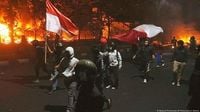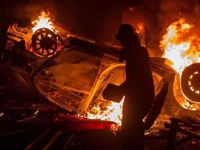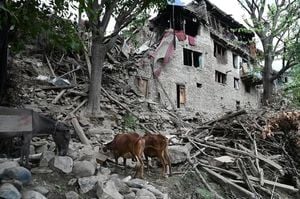Makassar, Indonesia — In a week marked by grief, outrage, and flames, Indonesia has been shaken by violent protests that left at least three dead, several injured, and government buildings in ruins. The unrest erupted after the death of Affan Kuniawan, a motorcycle taxi driver who was run over by a police tactical vehicle during demonstrations over low wages and alleged government excess. What began as widespread frustration over economic hardship and perceived privilege quickly escalated into one of the most serious crises facing President Prabowo Subianto since taking office.
On August 29, 2025, the city of Makassar on Sulawesi Island became the epicenter of tragedy. Protesters, furious over Kuniawan’s death the previous day, stormed the local city council building, hurling rocks and Molotov cocktails. According to Agence France-Presse, the violence spiraled out of control as demonstrators set fire to both the city and provincial council buildings, torched vehicles, and overwhelmed the limited security presence. Hundreds reportedly cheered and clapped as flames engulfed the structures, with one bystander captured on video shouting, "There are people upstairs!" as the inferno raged.
The consequences were devastating. Rahmat Mappatoba, secretary of the Makassar city council, confirmed to AFP that three people—two council staff members and one civil servant—were killed after being trapped inside the burning building. "This is beyond our prediction," Mappatoba told the news agency. "Usually during a demonstration, protesters only throw rocks or burn a tire in front of the office. They never stormed into the building or burned it." Two of the victims died at the scene, while the third succumbed to injuries in hospital. At least four others were injured and required hospital treatment, officials said. The fire was eventually extinguished, but the scars—both physical and emotional—remain.
The chaos in Makassar was not an isolated incident. Protests had erupted across Indonesia’s major cities, including the capital Jakarta, where hundreds gathered outside the headquarters of the Mobile Brigade Corp (Brimob). The paramilitary police unit, often criticized for its aggressive tactics, was blamed by demonstrators for Kuniawan’s death. According to BBC, protesters in Jakarta attempted to break down the gates of the Brimob compound and pulled a sign from the building’s facade. Isolated incidents of looting and damage to transportation facilities were also reported, while police deployed tear gas to disperse crowds earlier in the week.
Authorities responded swiftly to the public outcry. Seven police officers were detained for questioning in connection with the fatal incident that claimed Kuniawan’s life, police sources told BBC. President Prabowo Subianto, who has been in office since October 2024, moved quickly to address the crisis. On August 29, he visited the family of the deceased driver, promising a thorough and transparent investigation. In a statement, Prabowo said, "I have ordered last night's incident to be thoroughly and transparently investigated, and that the officers involved be held accountable." He further pledged that the government was "committed to guaranteeing the livelihood" of Kuniawan’s family, sharing images of his visit to their home.
The president’s personal involvement underscored the gravity of the situation. The unrest is widely seen as the first major test of Prabowo’s leadership, coming at a time when his administration is already under scrutiny for sweeping budget cuts and ambitious, populist policies—including a billion-dollar free meal scheme. Many Indonesians remain concerned about economic inequality and the perception that lawmakers enjoy lavish perks while ordinary citizens struggle to make ends meet.
As the violence spread from Makassar to other cities such as Bandung, the government’s anxiety became palpable. On August 30, State Secretary Prasetyo Hadi announced that President Prabowo had canceled a planned trip to China, where he was scheduled to attend a major international summit. "Due to domestic dynamics, the President wishes to continue to monitor the situation directly, as well as to lead directly and seek the best solution," Hadi said in a statement carried by Bloomberg. The decision to remain in Indonesia, rather than engage in high-level diplomacy abroad, sent a clear message that the crisis at home demanded the president’s full attention.
For residents of Makassar, the aftermath of the fire was a grim reminder of how quickly peaceful protest can turn deadly. Footage verified by AFP showed smoldering debris falling from the council building’s roof, surrounded by palm trees and the charred remains of vehicles. The city’s skyline was briefly lit by flames, while the sobering reality of three lost lives settled over the community. "They were trapped in the burning building," Mappatoba recounted, reflecting on the unprecedented escalation. "Usually during a demonstration, protesters only throw rocks or burn a tire in front of the office. They never stormed into the building or burned it."
Meanwhile, Indonesia’s police and political leaders are under pressure to restore public trust. The Brimob unit, already infamous for its heavy-handed approach, faces renewed scrutiny. Calls for accountability and justice have echoed through social media and the streets alike, with many Indonesians demanding not just answers, but systemic change. The government’s promise of a transparent investigation and support for the victim’s family is a start, but public confidence remains fragile.
The wider context of the protests cannot be ignored. Demonstrators were initially galvanized by long-standing grievances over low wages and what many see as excessive privileges for lawmakers. The tragic death of Kuniawan became a rallying point, transforming economic frustration into nationwide outrage. As the week unfolded, the protests revealed deep-seated tensions within Indonesian society—between citizens and the state, between economic hardship and political privilege, and between the promise of reform and the realities of governance.
As Indonesia moves forward, the events in Makassar serve as a stark warning of the costs of unchecked anger and the urgent need for dialogue and reform. President Prabowo’s leadership is now under the microscope, with his response to the crisis likely to shape both his administration and the country’s future. For the families of those lost and injured, and for a nation grappling with grief and uncertainty, the hope is that justice and meaningful change will follow the flames.






